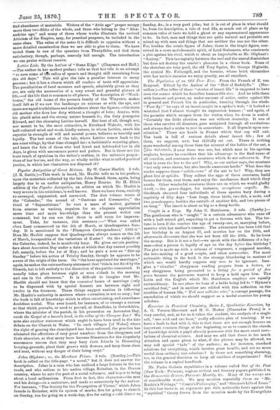Lettice Lisle. By the Author of "Stone Edge." (Chapman and
Hall.) —The author in her modest prefaea tells us that her tale is an attempt " to save some of tree relics of speech and thought still remaining from the old days." This will give the tale a peculiar interest to many persons ; but it has a charm which all readers of taste will appreciate. The peculiarities of local manners and speech, admirably given as they are, are only the accessories of a very sweet and graceful picture of life,—of the life that is common to all places. The description of "Wood- house," the old home of the yeoman family of the Winyates, makes itself felt as if we saw the landscape on canvass or with the eye, and there are equal truthfulness and naturalness about the figures,—the stern old mother who does her duty without a thought of love; Amyas, with his placid mien and the strong nature beneath it ; the fiery youngster Edward, and the charming Lettice herself. But best of all, though not, nor meant to be, the most attractive, is Everhard Walcott, with his half-cultured mind and weak, kindly nature, in whom Lattice, much his superior in strength of will and mental power, believes so heartily and loyally. The last scone of the tale, where Lattice comes back to the sea-coast village, by that time changed int) a fashionable watering-place, and hears the fate of those who had loved and befriended her in old days, is given with uncommon power and pathos. But is there not the least touch of cynicism in the writer's realism, in the unheroic propor- tions of her heraes, and the way, so wholly unlike what is called poetical justice, in which her characters are disposed of?




























 Previous page
Previous page